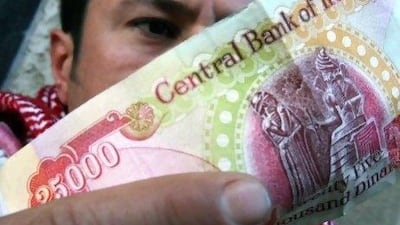Months of political wrangling over forming Iraq's next government have delayed approval of this year's budget, affecting businesses and efforts to improve public services.
Allegations of poll fraud in October's general election delayed the convening of parliament until January, and rival power blocs are now in a standoff over the distribution of government posts.
Mudhir Mohammed Salih, economic adviser to caretaker Prime Minister Mustafa Al Kadhimi, said the budget for 2022 will have to wait for the new government.
“As a caretaker government, we can’t discuss, approve and send the budget to parliament for final approval,” Mr Salih told The National.
“We are not seeing a budget soon without a new government and active parliament committees.”
In the meantime, the caretaker government's monthly spending is limited to a twelfth of the previous year’s budget amount, he said.
Last year's budget was 130 trillion Iraqi dinars ($89.65 billion), with an estimated deficit of 28.7 trillion dinars.
The main obstacle to forming the new government is enmity between Shiite populist cleric Moqtada Al Sadr, whose Sadrist Bloc emerged as the clear winner with 73 seats in the 329-seat parliament, and some of his Iran-backed Shiite rivals.
Mr Moqtada refuses to include former prime minister Nouri Al Maliki, whose State of Law won 33 seats, in the government.
As a result, the Co-ordination Framework, made up mainly of State of Law and the Iran-backed Fatah Alliance that won 17 seats, has threatened to lead an opposition that could hinder the work of the government or boycott politics.
Until an agreement is reached, Iraq’s budget — and the fate of millions — hangs in the balance.
With government expenditure making up nearly 50 per cent of gross domestic product, the delay will affect about 80 per cent of the country’s economic activities, Mr Salih said.
“As a result, all new projects slated for this year will be put on hold and spending will be only salaries and some ongoing projects,” he said.
On Wednesday, the Agriculture Ministry announced that much needed loans to farmers would be put on hold until the budget is approved.
The country’s business community is already feeling the pinch.
“Whenever there is no budget the market goes through an unprecedented recession at all levels,” said Mohammed Bek, chairman of the Baghdad-based Tell Afar Walls Company for General Trading and Construction.
“The hardest hit sector will be the private one as it depends heavily on the public budget,” Mr Bek, 37, told The National.
“Now, all our work will be suspended and the contractors who are waiting for the payment of financial dues have stopped working on their projects,” he added.
In 2014, Mr Bek’s company secured a deal with a state-run company as a second contractor on a project in the southern city of Karbala. But a few months later it was delayed due to lack of budget allocations.
The economy then suffered a major blow from low oil prices and the fight against ISIS, which seized nearly a third of the country in mid-2014.
As part of the austerity measures it applied, the government decided to delay payments to contractors for work they had done. It allocates part of the budget each year towards these payments in the budget, but even these instalments are delayed.
Work on Mr Bek’s project resumed in 2021, only to stop again until this year's budget is approved.
“They say 'whenever the budget is approved, we will release your money',” he said. “There are thousands like us in the market now.”
“We continue paying our financial commitments such as taxes and other fees,” he noted.
He has been forced to lay off about 80 per cent of his employees, a microcosm of Iraq's continuing economic malaise and the curse of high unemployment.
“At the end of the day, the people and the country’s interests will be impacted. If things continue like this, the damage will be enormous,” he said.
Iraq is still in need of rebuilding after the 2014-2017 war with ISIS left large areas of the north and west in ruins. Millions of Iraqis lack access to clean water, adequate electricity supply and proper health care.
In early 2018, Iraq appealed for about $88 billion for reconstruction at an international donors summit in Kuwait. Countries pledged about $30bn in loans and investment but there has not been any progress since then.


